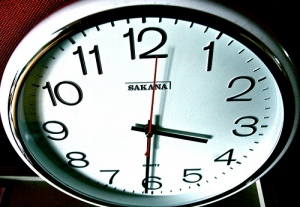Somewhere, a giant clock began to tick.
At some point during Tuesday’s orchestra rehearsal it dawned on me that our next performance (and my first with RCO) is less than two weeks away. I feel like I’m cramming for an exam, maybe the most fun, best kind of exam in my entire life – but an exam nonetheless. Our unofficial first cello missed rehearsal this week, leaving yours truly totally exposed for the cello-fraud I felt like. I left completely convinced that I need to be practicing a LOT more.
We made it through Miranda and Ferdinand with a few notes and Rondeau featured about ten minutes worth of cello section soloing the 30’th measure on repeat (slurred eight notes are the bane of my existence at the moment). I plucked my way through Pavane, pretty much air celloing the crazy shifting arco run around 40. Along came Brandenburg (First Movement) to knock me flat on my four stringed ass. Pretty inexplicably, cause the cello part isn’t ostensibly difficult, just features more of those bloody eight notes. By the time we got to the Quartetto in F Major I was sweating bullets. Thankfully , I’ve been working on F Major scale this week, so the timing couldn’t have been better. And that was where the lucky coincidences ended. The run of eight notes at measure 51 makes me wake up at night screaming, and the fact that it’s loaded with repetition for some reason only makes it more confusing. By the time we hit measure 65, I was ready to GO HOME (and not come back).
I keep reminding myself that this is only my fourth week, but hey, I am an overachiever. If I want to do it, I’m going to do it well. Or burn a hole in my brain trying.
*insert deep breath here*
I’ve decided that it’s best to have a few parameters in place before continuing on this journey.
1. Set realistic target: there is a slim chance I might be able to pick up the eighth note run (one-and-two-and-three-and) at 51 (and 65 and 77) in the Quartto – at tempo. But I know our first chair has it covered. So my goal is to concentrate on playing the 1-2-3 notes flawlessly on tempo and try to fill in the ‘and’ notes as time allows…(I still have three other pieces to work out in under two weeks)
2. Abandon pride, ye who enter here: Now is not the time to get shy about scribbling fingerings all over my sheet music – even the regular scale fingerings. My sight reading is passable, but I’ll push myself later. For now it’s cheat sheet, cheat sheet, cheat sheet.
3. Speaking of….Repetition, Repetition, Repetition: It’s the name of the game. I spent an hour tonight just working over the first eighth note run (seven measures) of Quartetto. Over, and bloody, over. It works. I’m focusing on the tricky spots we identified during rehearsal and working them until something bleeds.
On the upside, we have four rehearsals next week – I’ll be missing one for the Zoe Keating show on Tuesday – but between that and an hour at home I should be able to smooth my roughest edges and survive our lobby debut. The great thing is that I can do a bit of double duty since I’m supposed to be working on F Major and D minor scales for my lessons. Otherwise, lesson stuff is getting temporarily back-burnered. See you in a week Schroeder.

Comments
I think everyone jots down some fingerings on their sheet music esp. when there are many options. My sheet music is usually littered with all sorts of notes by the time I’m done working on it.
But your Infernal reference was funny….
You overestimate my skills :) I’m no stranger to making the normal sheet note notation (speed, extensions, dynamics) unfortunately in this case I meant every note in the measures. I’ve been challenging myself to do that as little as possible, to train true sightreading, but in this case I’m giving myself a pass!
You really think that’s abnormal? For example, if I have a single extension in a measure, I will mark that I need to do an extension but then, I will usually mark the extended fingerings till I’m back into a non-extended position (which could be a measure or more later). There are times when staying in extended position is just cleaner sounding than extending for a note then reverting back quickly. I can’t transition fast enough when the passage is quick. So I try to find a clean spot which is more accommodating.
Sometimes I need to do a double extension – say if you have a backwards extension followed immediately by a forward extension. Much cleaner to stretch between the two notes. What if you’re doing a slur between the two!
Plus anytime there is a key change my pencil comes out again. I get what you’re saying about sight reading the pieces and just playing, but I need all the reminders I can get for the piece to sound as smooth as possible.
I don’t think you (we) should feel guilty about having many marks – fingerings or otherwise. We do what we must, right? :-)
Your reassurance is admirable. I’m sure I’m not abnormal, nor am I engaging in any self flagellation as a result of my more heavily notated than normal sheet music. We each set unique goals for ourselves base on our skills, weaknesses and challenges. Being a more competent sight reader is one of mine.
Of course, my more immediate goal is doing my part to make sure my little group of strings sounds as awesome a possible on the 2nd. So whatever it takes to get there is worth it!
Comments are closed.